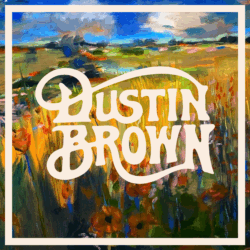Dustin Brown’s self-titled album is rooted in the grittiest realism and reaches straight for the heart of blue-collar America. In short, it’s an example of the exceptional ordinary.
 Hailing from Texas, Dustin Brown’s third album is immediately impressive. The second a guitar solo kicks in on the opening track, it makes you listen just a little closer, leaning towards ‘huh, this guy knows what he’s doing’. From that point, it only picks up, seamlessly transitioning through a 36-minute journey of cathartic honesty.
Hailing from Texas, Dustin Brown’s third album is immediately impressive. The second a guitar solo kicks in on the opening track, it makes you listen just a little closer, leaning towards ‘huh, this guy knows what he’s doing’. From that point, it only picks up, seamlessly transitioning through a 36-minute journey of cathartic honesty.
‘Falcon 9’ speaks on the decay of small-town America, of the darkness of commercial greed and its impact on the people whose lives are tangled up in that space – a theme that runs through the album and is explored through Brown’s gravelly, slightly world-weary voice. As he sings of the “death of the small-town USA”, lyrics on here wouldn’t feel out of place coming from American heroes like Springsteen or Mellencamp.
On ‘Burn’ – what is solidly the core of the album – Brown weaves together thoughts about growth and adulthood that could easily sit with the best of contemporary folk and an acoustic guitar. Throw in some heavier guitar work and confident percussion, and it moves into a rock-tinged Americana space. Brown digs out an honesty that hits, and it hits hard; picking out the flaws, the regrets and the realities of everyday life, ‘Burn’ in particular feels like the result of a few years of observation.
Adding in a moment of easy-going fun, ‘Baby Don’t’ shows that Brown has a witty side to his writing too. Following up with a laid-back bluesy vibe on ‘Ain’t No Love’, a guitar solo sparks a few flames into a blaze as he sinks back into the chorus – rambling across the south, he might have just picked up musical influences from each of the places he mentions. Musically, this album reaches to almost every corner of America. Recalling that there “ain’t no love there in Amarillo”, Brown writes and sings with a nostalgic longing – it’s clever and, as does each word he sings, is purposeful.
‘29th March’ is a starkly honest recollection of a love-story gone wrong, going from the carefree bliss of singing along to the radio, to not seeing eye-to-eye, to his own regrets and the lingering sorrow that comes with hurting someone you’ve found care and comfort in. The intricacy of simple details and brutal self-awareness on this track makes it clear why Brown has received comparisons to Jason Isbell and Lukas Nelson, and his inspiration in the words of Townes Van Zandt is evident. “Crispy chicken sandwich and a big sweet tea/ Riding in the car with the seats folded flat/ You turn the radio up while I sing in the back/ I’d like to thank you now/ For all that you’ve done/ How you’d help me out when no one would” capturing the importance and immensity of having someone there through the mundane. The mundane in the sunshine – the narrative of this track bringing up similarities to Isbell’s ‘Strawberry Woman’.
Dustin Brown is rootsy, gritty, honest and above anything else: raw. If it had to be categorised, it would probably sit somewhere in the folk infused heartland rock space – but that seems reductive, ultimately, Brown’s given us the voice of everyday America. “My culture ain’t your dime store costume” he sings on ‘Hard Hats’, as he wears his heart on his (purposeful) Carhartt sleeve after a day of real hard work.
Dustin Brown has got a soul that carries pieces of the normal, everyday, working-class American – it’s real. There is absolutely no doubt that this will go down as one of the most criminally underrated albums of 2025.



We couldn’t be prouder than we are for Dustin Brown. He has climbed the ladder the old fashioned way that represents his old soul.
So very proud of Dustin Brown, he has come so far and love what he does